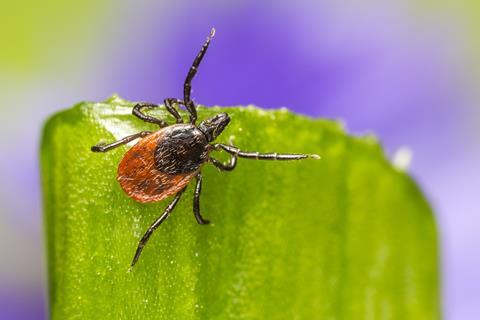The first confirmed domestically-acquired case of tick-borne encephalitis virus (TBEV) has been identified in a man who was bitten by ticks in Yorkshire, and another probable human case has been detected in the Loch Earn area of Scotland.
Both are described in new research being presented at this year’s European Congress of Clinical Microbiology & Infectious Diseases (ECCMID) in Copenhagen, Denmark (15-18 April).

The study by Dr Helen Callaby from the UK Health Security Agency (UKHSA) Rare and Imported Pathogens Laboratory, Porton Down and colleagues confirms that TBEV is now present in the UK. The diagnosis was first considered by the doctors looking after the patients and confirmed by testing at the UKHSA laboratory.
Tick-borne disease
“This study confirms the tick-borne encephalitis virus is present in parts of the UK where there are relevant tick and wildlife populations and may occasionally cause disease in humans,” said Dr Callaby.
“Physicians should consider the possibility of tick-borne encephalitis virus when patients present with unexplained encephalitis and a history of tick exposure, even if they have not travelled outside the UK, as the clinicians did in these cases.”
TBEV is a flavivirus spread by ticks and, more rarely, consumption of unpasteurised milk from infected animals. TBEV is found in western and northern Europe and northern and eastern Asia.
Ticks are becoming more common in parts of the UK, mainly due to increasing deer numbers. They live in undergrowth and latch on to humans when they walk through long grass.
Range of disease
AMI Trustee Sally Cutler, professor of medical microbiology at the University of East London, confirmed that TBE virus had been seen at low levels in ticks in the UK since 2019.
She said the virus comes in different variants, and the one being detected in the UK to date “has been one of the milder variants”.
Prof Cutler said: “Vaccines are used to protect populations in highly endemic areas, but we probably are not yet in a situation whereby we need this level of protection at this time.”
TBEV causes a range of disease from completely asymptomatic infection to mild flu-like illness, to severe infection in the central nervous system such as meningitis or encephalitis. Symptoms are similar to other causes of meningitis, and can include a high fever with headache, neck stiffness, confusion or reduced consciousness.
TBEV is diagnosed by polymerase chain reaction (PCR) and using serology. The Rare and Imported Pathogens Laboratory (RIPL) is the only diagnostic laboratory in the UK to perform such testing.
Before 2019, human TBEV had not been domestically acquired in the UK. In 2019 and 2020, two probable cases were reported, with compatible clinical syndromes, positive serology and lack of exposure abroad. However, for these cases there was no molecular isolation of the virus so they could not be confirmed.
The European subtype is associated with milder disease, with 20-30% of patients experiencing clinical disease. It is assumed that the UK cases are the European subtype, but this has not been proven to date.
Cases on the rise
TBEV cases are on the rise in Europe with some 3,800 reported in 2020 [2]. Vaccines can provide protection, but only for a limited time, and there is no cure. It is thought infected ticks may have arrived in the UK via migratory birds.
To find out more, researchers searched the RIPL database for confirmed and probable cases of TBEV detected between January 2015 and December 2022. They identified 17 cases with compatible clinical syndromes, almost half of which (8/17) had been diagnosed in 2022. The cases identified in 2022 included four cases of confirmed TBEV, two probable cases and two possible cases.
After alternative tick-borne complex diseases were ruled out by PCR testing, one of the confirmed TBEV cases was, based on travel and exposure history, considered to be UK-acquired.
“Although the risk to the general public is very low, it is important for people to take precautions to protect themselves from tick bites, such as covering their ankles and legs, applying insect repellent and checking clothes and your body for ticks, particularly when visiting areas with long grass such as woods, moorlands and parks,” said Dr Callaby.
Topics
- European Congress of Clinical Microbiology & Infectious Diseases
- flavivirus
- Helen Callaby
- Infectious Disease
- One Health
- Parasites
- Research News
- Sally Cutler
- tick-borne encephalitis virus
- UK & Rest of Europe
- UK Health Security Agency (UKHSA) Rare and Imported Pathogens Laboratory#
- University of East London
- Viruses







No comments yet